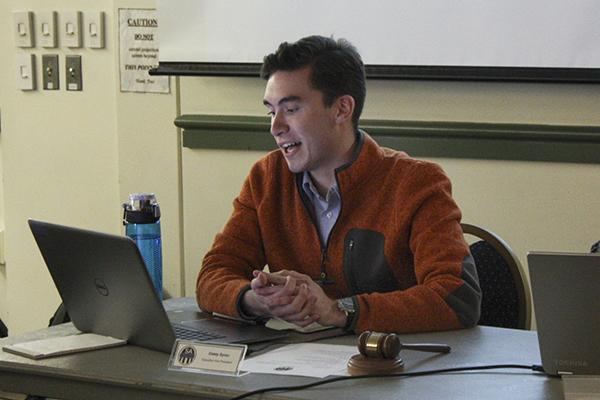“Slow and steady wins the race” seems to be the motto for this year’s Student Association Senate.
Though the SA Senate has been criticized in the past for its cyclical nature and inefficient meetings, Executive Vice President Casey Syron said the senate is working more efficiently, and behind the scenes, this semester. Syron, as well as some senators, said they expect more legislation to be discussed next semester after senators have had months to meet with administrators and lay the groundwork for bigger projects.
So far this academic year, the senate has passed eight out of the nine resolutions that have been brought to a vote. Syron said the high passing rate, combined with a low number of measures, means senators are tweaking the language of bills before meetings and sending each other questions or comments about resolutions before the meetings take place.
“One of the things we’re focusing on is having meaningful legislation. There were pieces of legislation last year that were meaningless – there’s only so much relative power given to the SA,” he said.
He said at the beginning of the year, he asked senators to create an individual action plan and to identify administrators they could work with on major topics like affordability and mental health.
“Rather than introducing a bill, work on your advocacy project and that’s how we can formally announce this thing we achieved,” Syron said he told senators at the beginning of the year.
“It’s better than saying ‘we condemn this’ and wiping our hands [of it],” Syron said.
Most of the nine resolutions voted on by the group have involved their own inner workings, which senators say will help streamline the legislative process for future senates.
Sen. Thomas Falcigno, CCAS-U and chair of the senate’s leadership committee, has sponsored six resolutions this semester. In the group’s last meeting, senators debated a resolution proposed by Falcigno meant to prevent disruptive debates during meetings. The group rejected the resolution, called the Legislative Timeline Act, in a close vote.
So far this semester, the senate has adopted Robert’s Rules of Order, a set of parliamentary rules, and also approved a measure to send recommendations to the Joint Committee on Faculty and Students. The group eliminated the Marvin Center Governing Board from its bylaws this semester.
Falcigno said his main focus this year has been to comb through all 80 pages of the senate’s bylaws and rewrite lengthy procedures. He said senators have held meetings with administrators already this semester.
And at the next SA Senate meeting, senators will appoint new members to one of three committees: finance, academic affairs and student life.
The group had a “hiccup” last month, when former finance committee chair Nancy Mannebach resigned suddenly, Falcigno said.
Still, he said the group “worked through that in a manner that was very smooth.”
Last year, some senate meetings were chaotic, filled with drawn-out debates and long discussions about senate procedures, and even led to one senator recommending for a vote of no confidence in the former SA president and executive vice president.
Sen. Brady Forrest, CCAS-G, who is serving his second year as a senator, said he thought the senate has been more cohesive this year. He said with seven new joining the group at the next meeting, there’s “a lot of energy ready to get work done.”
He said in the coming months, he hopes to propose legislation for transgender students, like including proper pronouns on BanWeb, and advocating for graduation student space.
“Overall, it’s a more productive senate,” Forrest said. “We’ll see how well that holds, but hopefully we can keep momentum going.”







